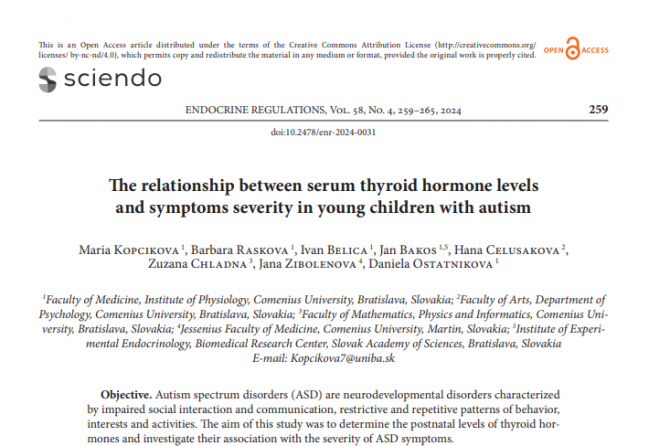
AUTORI: Kopcikova, M., Raskova, B., Belica, I., Bakos, J., Celusakova, H., Chladna, Z., Zibolenova, J., Ostatnikova, D.
ABSTRAKT:Objective. Autism spectrum disorders (ASD) are neurodevelopmental disorders characterized by impaired social interaction and communication, restrictive and repetitive patterns of behavior, interests and activities. The aim of this study was to determine the postnatal levels of thyroid hormones and investigate their association with the severity of ASD symptoms. Methods. The study included 56 children (46 boys and 10 girls) with ASD aged 24–42 months. For ASD diagnostics the Autism Diagnostic Observation Schedule – second version (ADOS-2) and the Autism Diagnostic Interview-Revised (ADI-R) – interview with the child’s parents or guardians were used. Venous blood was drawn right after the diagnostic procedures to analyze serum thyroid-stimulating hormone (s-TSH), free triiodothyronine (s-fT3), and free thyroxine (s-fT4) levels. Linear regression analysis was conducted to assess the relationship between the concentrations of thyroid hormones and ASD symptoms severity. Results. Serum concentrations of measured hormones were within normal reference ranges in almost all children. Decline of s-TSH was significantly associated with an increase in the severity of impaired social interaction and impaired communication as rated by parents (ADI-R) and with a higher prevalence of stereotyped behavior as observed in the diagnostic examination (ADOS-2). A decrease in s-fT3 was associated with higher frequency of stereotyped behavior as assessed by parents (ADI-R). Neither sex nor age were significant predictors. Conclusion. Although thyroid hormone levels were normal, we demonstrated an association of thyroid hormones with ASD symptoms.
ENDOCRINE REGULATIONS, Vol. 58, No. 4, 259–265, 2024
doi:10.2478/enr-2024-0031


